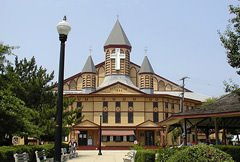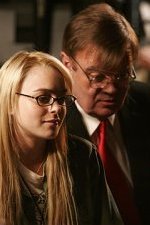 This evening I have the pleasure of seeing one of my favorite performers, Garrison Keillor (of A Prairie Home Companion – the Saturday-evening radio show on NPR, and more recently, a major motion picture of the same name). He’s on the road with a company of talented actors and musicians, traveling under the name, “The Rhubarb Tour.” Their venue this evening is the Great Auditorium at Ocean Grove, New Jersey – a curious town with a Methodist camp-meeting heritage, filled with quaint, rambling houses adorned with Victorian gingerbread.
This evening I have the pleasure of seeing one of my favorite performers, Garrison Keillor (of A Prairie Home Companion – the Saturday-evening radio show on NPR, and more recently, a major motion picture of the same name). He’s on the road with a company of talented actors and musicians, traveling under the name, “The Rhubarb Tour.” Their venue this evening is the Great Auditorium at Ocean Grove, New Jersey – a curious town with a Methodist camp-meeting heritage, filled with quaint, rambling houses adorned with Victorian gingerbread.The auditorium itself – a nineteenth-century wood-frame behemoth – seats 6,500, and Garrison pretty nearly fills the place. It’s a joyous, somewhat nostalgic evening, filled with marvelous folk music, amusing dramatic sketches and – of course – one of Garrison’s famed “news from Lake Wobegon” monologues. Although this particular show isn’t being broadcast, it’s still conducted as though it were on the radio. We watch Fred Newman (the puckish sound-effects guy) and the other actors as though we were kids peering through a knothole in a ballpark fence – even though everything the performers are doing is intended for the ear, rather than the eye.
 One line Garrison speaks in a dramatic sketch sticks with me. “Do you think God is a humorist?” asks one of the actors – after recounting a whole list of disasters, both natural and human.
One line Garrison speaks in a dramatic sketch sticks with me. “Do you think God is a humorist?” asks one of the actors – after recounting a whole list of disasters, both natural and human.“I think God is a humorist,” Garrison replies, hopefully – “but he’s working with a slow audience.”
I find that to be as good an answer to the problem of human suffering as any (bear in mind, I’ve found no answer to this question to be completely satisfying). How can God permit people to get sick – seemingly at random, with neither rhyme nor reason to the selection – and still be adjudged kind and benevolent? Nothing wipes a smile off a person’s face like the words, “You have cancer” – so why does the Almighty ever allow such hard words to be spoken?
Maybe the problem lies not with God, but with us. Maybe we’re simply unable to peer over the next hill, to pick our way through the fog that clings to the ground like cobwebs. Maybe the divine joke has been told, centuries ago – and the universe is still laughing uproariously – but we poor, dumbfounded humans are left displaying that deer-in-the-headlights look, saying, “I don’t get it.”
I’ll admit it. At times I’ve been “a slow audience,” when it comes to my own cancer. Little by little, the truth is dawning on me that having this disease is by no means the worst thing that could happen. I’ve learned some remarkable things since my diagnosis: lessons about life, and hope, and love, and family, and perseverance, and faith. In the great scheme of things, how much does it matter that I spent a third of a year pumped full of noxious chemicals and feeling, alternately, nauseous and depressed?
 A couple weeks ago, I went to see Garrison Keillor’s (and Robert Altman’s) film, A Prairie Home Companion. In the film, a radio show strikingly similar to Keillor’s own is facing its final broadcast. A large corporation has bought their ramshackle theater, and plans to tear it down for a parking lot. Some of the cast members can hardly believe this venerable entertainment institution is headed for oblivion – especially since Garrison, the host, is planning no special thank-you or retrospective for his final broadcast. His plan is to do a normal show, darken the “on the air” light and just walk away.
A couple weeks ago, I went to see Garrison Keillor’s (and Robert Altman’s) film, A Prairie Home Companion. In the film, a radio show strikingly similar to Keillor’s own is facing its final broadcast. A large corporation has bought their ramshackle theater, and plans to tear it down for a parking lot. Some of the cast members can hardly believe this venerable entertainment institution is headed for oblivion – especially since Garrison, the host, is planning no special thank-you or retrospective for his final broadcast. His plan is to do a normal show, darken the “on the air” light and just walk away.Lola, teenaged daughter of one of the singers – played by Lindsay Lohan – asks him, “This isn’t really going to be your last show, is it?”
“Every show is your last show. That’s my philosophy,” replies Garrison.
“Thank you, Plato,” deadpans Lola’s Aunt Rhonda (played by Lily Tomlin).
Is the radio host being wise? Or is he merely in denial? The movie leaves us wondering – although, having had cancer, I’d vote for “wise.” Plato’s mentor, Socrates, used to advise his students to live each day as though it were their last. The Psalmist encourages us to “number our days,” so we may gain “a wise heart.”
Maybe it’s all part of the divine joke. And maybe, just maybe, we’ll get it someday.